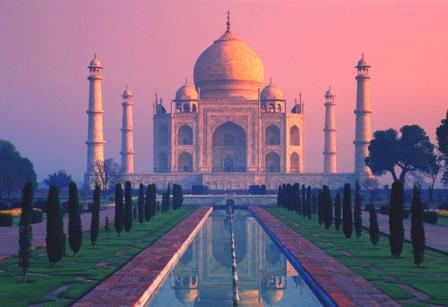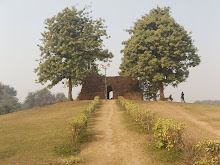On the evening of November 26th, while most of us were out buying last minute groceries, on the road or in the air travelling to be with our loved ones or perhaps just salivating over visions of turkey, mashed potatoes and stuffing, a quite different reality was brewing in the Indian city of Mumbai. Sadly, for many involved, the reality was deadly; deadly to the tune of at least 188 casualties with another 293 estimated to be injured on a gruesome attack on humanity. These figures are truely startling as was the manner of violence that these 10 terrorists upheld. Though it was said that some of the killers were searching out those with American and British passports, it was later revealed and obvious that the slayings were indiscriminant, if not primarily directed toward the peaceful citizens of India, who took the brunt of the bloodshed with 158 deaths. Not surprising, the nation of India is outraged. My heart goes out to all those affected.
I'd be lying if I were to say that this accident has not made me wonder about my safety in a nation whose top priority is certainly not security. At first it seemed to me that the terrorists were targeting the extravagance of The Taj Mahal Palace and Tower and the Oberoi Trident Hotel where rooms run at least US$325 and are frequented by western travellers and the Indian elite. As more information became available it became clear that the attacks were cast on all races and nationalities. Following the initial shock and grief, I began to think how this might effect my trip. I thought of the first blog I wrote, of the nirvana-like image I tried to compose of India. Watching the drama unfold on the news that night, I had recalled learning, just a few nights before as I read up on Mumbai in my Lonely Planet guide about the popular, Leopold's Cafe. This cafe, I read, was a tourist hotspot where "most tourists end up at this Mumbai travellers' institution at one time or another" and where "a rambuncious atomosphere conducive to swapping tales with random strangers" would definitely be a place that I could spend a little time. 10 people died at Leopold's Cafe and another 58 at Chhatrapati Shivaji rail terminus, where any shoestring traveller such as myself would pass through! These are places I would be! For the record, I can safely say that I will not be anywhere near any luxurious hotels such as the Taj or the like. $5 hostels suit me just fine!
It does make me wonder, though I do not fear and remain steadfast and dedicated to this trip. Since all of this has happened I've heard lots of theories why a comfortable, safe American does not belong India. Firstly, if anyone thinks that by staying put in our own country is the only sure way to keep safe from terrorists or terrorism, all we have to do is remember 9/11, where not 188, but 2,974 innocent died. Furthermore, I feel that terrorism is not confined to the outward machine gun and grenade melee that we've seen in these and other attacks. No, terrorism can be more subtle and the problem is not locality. Secondly, wouldn't we become prisoners of these malicious terrorists' ideals to not continue in a path to our hopes and dreams. I think we'd do right by them to fear and alter our journeys. After all, isn't that what they're after; to disrupt, to promote chaos? Moreover, as the story plays out, the roots of this violence and hatred appear to be rooted further beneath the surface than most of us outsiders realize.
Resisting the temptation to turn this blog into a history/sociology lesson, I'd like to quickly bring to attention a deep hatred that has persisted between India and their bitter rivals and neighbors to the west, Pakistan. I recently watched the magnificent 3+ hour-long film, Gandhi. A LOT happened and turns out Gandhi was more than just a little Indian in a loincloth who walked a lot. Gandhi almost single-handedly brought India out of British rule and into independence, by, you guessed it...non-violence. Oddly enough, India's real troubles began with the clashing and eventual segregation of the Hindus and Muslims following their victory of independence. A partition of India was the consensus of the political leaders (not to Gandhi, but he reluctantly agreed), which drew the lines of Muslim majority Pakistan and East Pakistan (present day Bangladesh) and the Hindu majority, present day India. The coming years saw a great deal of violence between Hindus and Muslims, over and within the borders of each country, which prompted Gandhi's famous fast-to-death as a means to quell the insanity. The fast nearly took Gandhi's life, but miraulously elimited almost all violence between Muslims and Hindus in the region. Gandhi, eventually recovered after a satisfatory improvement, but was assasinated on the 30th of January, 1948 by a Hindu extremist and strife has cloaked the region of India and Pakistan, Hindus and Muslims ever since. The attacks on Mumbai and India by what is widely believed to be Pakistani terrorist groups has just doused this bonfire with gasoline and the reactions are incendiary.
Meanwhile in Michigan, I've grown anxious. Perhaps I've jumped the gun on the actual commencement of this journey. It seems more like a year, not a month, since this trip was realized and the days getting longer and longer. What's worse is that I can admit with a straight face that I've got a patchy t.v. schedule to follow each day, have been looking forward to the next victim voted off of Survivor - Gabon and have solved a mission in Ghost Recon 2, the X-Box game. Last Thursday and Friday did, however, provide a substantive reason to get out of bed (and rather early, at that) to substitute teach 4th graders and high school/junioir high gym class, respectively. What a treat, to actually put my time toward something other than slugging coffee and surfing the net all day! If only I can get that elusive wake-up call from here on, until I leave. Alas, the 17th draws nearer!
Back in India, many citizens have become restless. They've expressed an intolerable rage and want revenge and punishment to those who have brought such destruction to their peaceful nation. What would Gandhi think? I'll end with with a few quotes from the little Indian in the loincloth..."Nonvioloence is the greatest force at the disposal of mankind. It is mightier than the mightiest weapon of destruction devised by the ingenuity of man" and "an eye for an eye makes the whole world go blind." Does this kind of courage exist today?
Subscribe to:
Post Comments (Atom)


1 comment:
Though I am not religious in the least... amen, boy. Anything can happen to you, anywhere in the world. And nothing should stop you from going somewhere to help people. I actually just watched 'Ghandi' two weeks ago for the first time, and before that I am sorry to admit that I didn't know really any of his life story! I think the thing that surprised me the most was his upper class foreign-educated background. It made me really think about his actions. He was conscientious about every move he made, and it made me wonder if he knew the greatness of what would come of it.
Post a Comment